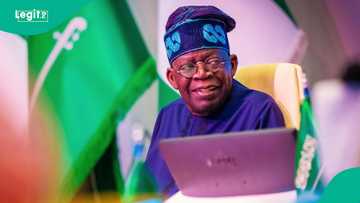Nigeria’s new disability law: 10 important facts to know
A few weeks after fielding questions on disability law at The Candidates, a programme anchored by journalist Kadaria Ahmed on NTA, President Muhammadu Buhari on Wednesday, January 23 signed into law, the Discrimination against Persons with Disabilities (Prohibition) Act.
The bill which seeks to criminalise discrimination against persons with disabilities was passed by the 8th Senate on March 28, 2018 and transmitted to the president in December of the same year.
Ita Enang, President Buhari’s National Assembly liaison officer, who announced the president’s assent on Wednesday night.
READ ALSO: Breaking: Oby Ezekwesili withdraws from presidential race
The new bill would see corporate entities and individuals face sanctions if found guilty of discriminating against persons with disabilities.
Here are ten important things to know about the new law:
Establishment of National Commission for Persons with Disabilities
1. Section 31 of the Act states that the National Commission for Persons with Disabilities will be established and an Executive Secretary will be appointed as the head of the commission.
Fine
2. The new law prohibits all forms of discrimination against persons with disability. Violating the law attracts a fine of N100,000 or a term of six months imprisonment for individuals. For corporate bodies, the law imposes a fine of one million naira.
Transportation
3. It is prohibited, according to the new law, to discriminate against people living within public transportation facilities. The public transportation service providers are to make provision for the physically, visually and hearing impaired and all persons howsoever challenged. This applies to seaports, railways and airport facilities.
Education
4. The rights and privileges of disabled persons, according to the new disability law, include education, health care, priority in accommodation and emergencies.
Right to charge offenders to court
5. The new law also gives Nigerians living with disabilities the right to file a lawsuit for damage against any defaulter, individual or corporate.
Five-year transitional period
6. The law provides for a five-year transitional period within which public buildings, structures or automobile are to be modified to be accessible to and usable by persons with disabilities, including those on wheelchairs.
Inspection of new structures to ensure they are compliant with the new law
7. With the new law, new public structures plans will be inspected by relevant authorities to ensure that the plan conforms with the building code before being constructed.
Condition for approval of public structures
8. A government or government agency, body or individual responsible for the approval of building plans shall not approve the plan of a public building if the plan does not make provision for accessibility facilities in line with the building code.
Offence for approving public structures not accessible to disabled persons
9. Also according to the law, any officer who approves or directs the approval of a building plan that contravenes the building code, commits an offence which is liable on conviction to a fine of at least N1million or a term of imprisonment of two years or both.
Employment opportunities
10. All public organisations are mandated by the law to reserve at least five percent of employment opportunities for these persons.
PAY ATTENTION: Install our latest app for Android, read best news on Nigeria’s #1 news app
Meanwhile, Legit.ng previously reported that President Buhari pledged not to compromise in providing good leadership that would guarantee better life for all Nigerians.
Buhari made the pledge when he led All Progressives Congress (APC) presidential campaign team on a courtesy visit to the sultan of Sokoto, Alhaji Sa’ad Abubakar III, at his palace on Wednesday, January 23, in Sokoto.
The president also pledged not to compromise the trust of the people, stressing that his administration has fulfilled the campaign promises it made in 2015 on tackling insecurity, fighting corruption and generating employment.
NAIJ.com (naija.ng) -> Legit.ng We have updated to serve you better
People with disabilities challenge Nigerian ministers | Legit TV
Source: Legit.ng





